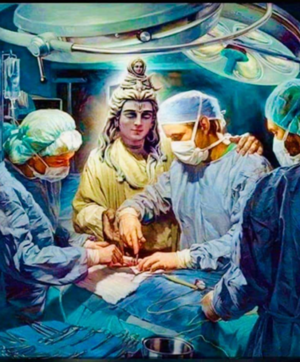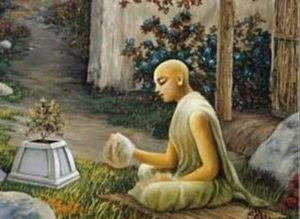Talk:Transcending Karma through Moksha:Bhakti Yoga and Karma:Destruction of Kriyamāna Karma by Bhakti Yoga
By Vishal Agarwal
The same verses of the Gītā as quoted above apply in this category as well. The Kriyamāṇa Karma of a perfected adherent of Bhakti Yoga does not produce any fruit because it is done as an offering to the Bhagavān.
“Whatever you do, whatever you eat, whatever oblations you offer, whatever you give, and whatever austerities you perform, O son of Kuntī, make it an offering to Me.” Gītā 9.27
“You shall certainly be liberated from the bonds of karma, which produce good and evil fruit. With your mind disciplined by the yoga of renunciation, you shall get liberated and will come to Me.” Gītā 9.28
The Bhagavān assures us that even an evil person who resolves to serve Him, love Him, and worship Him sincerely goes to the Bhagavān, for no true devotee ever perishes, and his account of past evil actions is erased.
He does not experience the typical effects (pain, temporariness, etc.) of the fruit of his actions because he has surrendered himself completely to the Divine Will, and the Bhagavān Himself ensures that His Bhakta is freed from all evil effects of Karma.
“Hear from Me the supreme word, the most secret of all. You are surely loved by Me, and therefore I shall tell you what is good for you.” Gītā 18.64
“Fix your mind on Me, be devoted to Me, worship Me, and offer your obeisance to Me. In this way, you shall truly come to Me. I promise you, because you are dear to Me.” Gītā 18.65
“Abandoning all Dharmas completely, take refuge in Me alone. I shall liberate you from all evils; do not grieve.” Gītā 18.66
Abandoning Dharmas does not mean that we forsake our worldly or spiritual duties. Rather, it means that we perform Pravṛtta Karma as our offering to the Bhagavān and place our hope for liberation not in the fruits of our actions but in the grace of the Supreme.
Haridās Ṭhākur: The Muslim Who Would Not Give Up His Faith in Kṛṣṇa[edit]
One of the most revered disciples of Śrī Caitanya Mahāprabhu was Haridās Ṭhākur, born in 1464 CE to Muslim parents in Budan (Jessore District, present-day Bangladesh). His original name is lost to history. In the Gauḍīya Vaiṣṇava tradition, he is considered a dual incarnation of Bhagavān Brahmā and Bhakta Prahlāda.
Despite early opposition from conservative Hindus, Haridās became a devoted follower of Kṛṣṇa under the influence of Advaita Ācārya. It is said he chanted the holy names of Kṛṣṇa 300,000 times daily. Śrī Caitanya, who became his Guru, honored him with the title Nāmācārya and gave him the responsibility of leading nāma-saṅkīrtana in Navadvīpa.
Bengal was then ruled by the Muslim Sultan Hussain Shah, who did not tolerate public displays of Hindu worship. Haridās's public devotion and conversion were seen as a challenge. He was imprisoned, where he preached the Vaiṣṇava faith even to the inmates, declaring there was no contradiction between Islam and Hindu Dharma.
This angered the authorities. The local magistrate sentenced him to be whipped in 22 marketplaces.
Haridās endured the punishment peacefully while continuously chanting the names of Kṛṣṇa. When assumed dead, he was thrown into a river, but miraculously survived.
Later, he followed Śrī Caitanya to Puri, then under the rule of King Pratāparudra. Though he was not allowed entry into the Jagannātha Temple due to his Muslim birth, Śrī Caitanya arranged for him to reside nearby, where he could see the temple spire and receive daily Prasāda.
When his end was near, Haridās requested Śrī Caitanya to place His foot upon his chest. The Bhagavān fulfilled this wish and conducted his funeral with His own hands on the shores of Puri. Haridās Ṭhākur’s Samādhi remains there to this day.
His life is a shining example of Bhakti overcoming caste, creed, and persecution. Despite immense suffering, Haridās’s love for Kṛṣṇa remained unwavering, and the Bhagavān Himself assured his spiritual liberation.
The Redemption of Vālmīki[edit]
Another powerful example is the transformation of Vālmīki, the author of the Rāmāyaṇa. Originally a highway robber, Vālmīki’s life changed through deep devotion to Śrī Rāma. Through penance and repetition of the name of Rāma—even mistakenly at first—he was purified and ultimately received divine knowledge, enabling him to compose one of the greatest epics in world literature.


